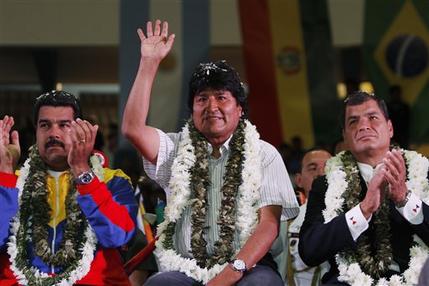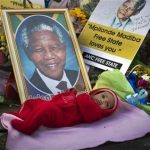COCHABAMBA, Bolivia (AP) — South America’s leftist leaders rallied to support Bolivian President Evo Morales after his plane was rerouted amid suspicions that NSA leaker Edward Snowden was on board and demanded an apology from France, Italy, Portugal and Spain.

The presidents of Argentina, Ecuador, Suriname, Venezuela and Uruguay joined Morales in the Bolivian city of Cochabamba late Thursday to address the diplomatic row. Morales used the gathering to warn that he would close the U.S. Embassy in Bolivia if necessary.
Morales again blamed Washington for pressuring European countries to refuse to allow his plane to fly through their airspace on Tuesday, forcing it to land in Vienna, Austria, in what he called a violation of international law. He had been returning from a summit in Russia during which he had suggested he would be willing to consider a request from Snowden for asylum.
Spanish Foreign Minister Jose Manuel Garcia-Margallo said Friday they and other European countries were told Snowden was aboard the Bolivian presidential plane.
The minister did not say who supplied the information and declined to say whether he had been in contact with the United States. But he says European countries’ reactions were based on this information.
Latin American leaders were outraged by the incident, calling it a violation of national sovereignty and a slap in the face for a region that has suffered through humiliations by Europe and several U.S.-backed military coups.
“United we will defeat American imperialism. We met with the leaders of my party and they asked us for several measures and if necessary, we will close the embassy of the United States,” Morales said in the city where he started his political career as a leader of coca leaf farmers. “We do not need the embassy of the United States.”
Morales’ government has had a conflictive relationship with Washington.
It expelled the U.S. ambassador and agents of the U.S. Drug Enforcement Administration in 2008 for allegedly inciting the opposition. The Andean nation restored full diplomatic ties with the U.S. in 2011. But relations soured again amid mutual distrust on drug war politics and hit an especially low point after Secretary of State John Kerry referred to Latin America as Washington’s “backyard” in April 2013.
Morales expelled the U.S. Agency for International Development in May for allegedly seeking to undermine his government.
In a joint statement read after the summit, the presidents also said they would back Bolivia’s official complaint with the U.N. Human Rights Commission
Ecuadorean President Rafael Correa said that he and other leaders were offering full support to Morales following the rerouting of the plane, calling it an aggression against the Americas.
“We’re not going to accept that in the 21st century there’s first, second and third rate countries,” Correa said.
“The leaders and authorities in Europe have to take a lesson in history and understand that we’re not 500 years behind. This Latin America of the 21st century is independent, dignified and sovereign.”
Venezuelan President Nicolas Maduro protested alleged attempts by Spanish officials to search the Bolivian presidential plane and accused the CIA of encouraging several European countries to deny the presidential plane their airspace.
“A minster of one of those European governments told me personally that it was the CIA who gave the order to the aeronautical authorities, the one who gave the alert that Snowden was on the plane,” he said at a rally at a sports arena ahead of the summit. “The CIA is more powerful that governments.”
Argentine President Cristina Fernandez said Latin Americans treasured freedom after fighting for their independence from Europe in the 19th century and then surviving Washington’s 20th-century history of backing repressive regimes in the Americas.
She then demanded an apology for the plane ordeal.
“I’m asking those who violated the law in calm but serious manner, to take responsibility for the errors made, it’s the least they can do,” Fernandez said. “To apologize for once in their life, to say they’re sorry for what they’ve done.”
Morales has said that while the plane was parked in Vienna, the Spanish ambassador to Austria arrived with two embassy personnel and they asked to search the plane. He said he denied them permission.
Morales, long a fierce critic of U.S. policy toward Latin America, received a hero’s welcome in an airport in the Bolivian capital of La Paz late Wednesday night. His return followed the dramatic, unplanned 14-hour layover in Vienna.
Bolivia’s government said France, Spain and Portugal refused to let the president’s plane through their airspace because of suspicions that Snowden was with Morales.
Ahead of the meeting, Morales had said that his ordeal was part of a plot by the U.S. to intimidate him and other Latin American leaders and urged European nations to “free themselves” from the U.S.
France sent an apology to the Bolivian government. But Morales said “apologies are not enough because the stance is that international treaties must be respected.”
Spain’s Foreign Affairs Minister Jose Manuel Garcia-Margallo said his country did not bar Morales from landing in its territory.
Amid the tensions, the U.S. embassy in La Paz cancelled Independence Day celebrations scheduled for Thursday. In the eastern city of Santa Cruz, Bolivian government sympathizers painted protest slogans on the doors of the American consulate.
Morales said he never saw Snowden when he was in Russia, and that Bolivia had not received a formal request for asylum for him.
Bolivia has said that it will summon the French and Italian ambassadors and the Portuguese consul to demand explanations.
Despite the complaints, there were no signs that Latin America leaders were moving to bring Snowden to the region that had been seen as the most likely to grant him asylum.
Although Latin American presidents sympathized with Morales and condemned his ordeal, several key regional leaders missed the summit.
Brazil was represented at the meeting by President Dilma Rousseff’s top international adviser but Foreign Minister Antonio Patriota missed the summit because he is attending meetings in Europe.
The presidents of Colombia, Chile and Peru, who have strong ties to the U.S., did not attend.
It’s still unclear whether European countries did block the plane and, if so, why. French, Spanish and Portuguese officials have all said the plane was allowed to cross their territory.
The emergency stop in Austria may have been caused by a row over where the plane could refuel and whether European authorities could inspect it for signs of Snowden.
The U.S. has declined to comment on whether it was involved in any decision to close European airspace, saying only that “US officials have been in touch with a broad range of countries over the course of the last 10 days,” about the Snowden case.
“The message has been communicated both publicly and privately,” State Department spokeswoman Jen Psaki said Wednesday. “He should be returned to the United States.”
Snowden remains out of public view, believed to be stuck in a Moscow airport transit area, seeking asylum from one of more than a dozen countries.





